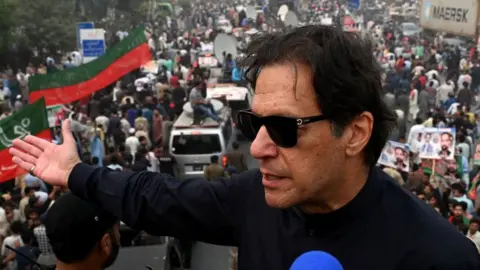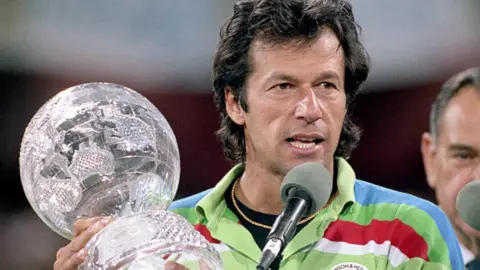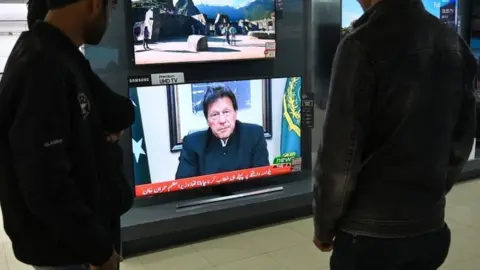Imran Khan: Why the gun attack on the Pakistan ex-PM matters to India
 Getty Images
Getty ImagesThe gun attack on Pakistan's ousted Prime Minister Imran Khan has made headlines across India, where he is a household name.
Mr Khan's is a well-known personality in the country despite the acrimonious relations between Delhi and Islamabad.
At a press briefing on Thursday, India's External Affairs Ministry spokesperson Arindam Bagchi said India was "closely keeping an eye" on the situation in Pakistan.
Writing in the Indian Express newspaper, political commentator Sanjay Baru called the attack a "turning point", saying that the attempt on Mr Khan's life had "dramatically raised the stakes" on the challenges faced by political leadership in Pakistan.
On Indian Twitter, Pakistan swiftly rose to the top of trends.
Born to a wealthy family, an ace cricketer who led his country to a victory in the 1992 World Cup, Mr Khan was the heartthrob of an entire generation of Indians who grew up watching him play cricket during the 1990s.
Mr Khan has visited India on multiple occasions and often made news by meeting high-profile Indians like Bollywood personalities.
 Getty Images
Getty ImagesAn old video of Mr Khan and Amitabh Bachchan enjoying a qawwali performance by legendary Pakistani singer Nusrat Fateh Ali Khan continues to be shared and watched widely in India.
In 2018, when Mr Khan announced he would run for Pakistan's prime minister, his promises around eliminating corruption in the country deeply resonated with Indians.
He also spoke extensively about building a sustainable and a peaceful relationship with India, which sparked hopes of improving relations between the neighbours
But despite his popularity and promises, relations between India and Pakistan only worsened under Mr Khan's premiership.
Tensions between the neighbours spiked when 40 members of India's security forces died in a suicide bombing on their convoy in February 2019 - Delhi alleged that Pakistan-based terror group Jaish-e-Mohammad was behind it.
Mr Khan went on TV to deny the allegations and called for India to "stop blaming Pakistan without any proof or evidence".
A low point came in 2019 when India stripped the portion of disputed Kashmir that it administers - which is also claimed by Pakistan - of special autonomy, and split it into two federally-administered territories.
Mr Khan's government dubbed the move as an "assault on Kashmir and its people", indefinitely suspended trade with India and warned about "an imminent military escalation" between the two nuclear powers.
Since then, an uneasy stalemate has prevailed.
 AFP
AFPPakistan's growing ties with China have also become a headache for India since the clashes between the Indian and Chinese armies over a long-running Himalayan border dispute in 2020.
Anil Trigunyat, a former Indian diplomat says that Mr Khan is "a very likeable person", but his popularity in India has taken a hit because of the recent developments.
"When you become the leader of a country, and when you take positions which are against a country - in this case India - then it dampens that spirit of bonhomie that one does feel with a person due to cricket," he told the BBC.
Mr Trigunyat condemned the attack on Mr Khan and said he hoped for peace and normalcy in relations between the countries, which is "definitely in our interest and theirs too".
"But if anti-India centric approaches remain the hallmark of their [Pakistan] polity, then we cannot expect a great change," he added.
For Mr Khan, the attention in India - both good and bad - is nothing new.